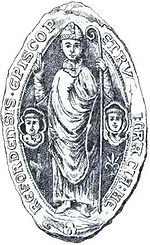Peter of Aigueblanche
| Peter of Aigueblanche | |
|---|---|
| Bishop of Hereford | |
 |
|
| Elected | 24 August 1240 |
| Installed | after Christmas 1240 |
| Term ended | 27 November 1268 |
| Predecessor | Michael |
| Successor | John de Breton |
| Other posts | Archdeacon of Shropshire |
| Orders | |
| Consecration | 23 December 1240 by Walter de Gray, Archbishop of York |
| Personal details | |
| Born | Aigueblanche |
| Died | 27 November 1268 |
| Buried | Hereford Cathedral |
| Denomination | Catholic |
Peter of Aigueblanche (or Peter of Aquablanca; died 27 November 1268) was a medieval Bishop of Hereford. A nobleman from Savoy, he came to England as part of the party accompanying King Henry III's bride Eleanor of Provence. He entered the royal service, becoming bishop in 1241. He then served the king for a number of years as a diplomat, helping to arrange the marriage of Prince Edward. Peter became embroiled in King Henry's attempts to acquire the kingdom of Sicily, and Peter's efforts to raise money towards that goal brought condemnation from the clergy and barons of England. When the barons began to revolt against King Henry in the late 1250s and early 1260s, Peter was attacked and his lands and property pillaged. He was arrested briefly in 1263 by the barons, before being mostly restored to his lands after the Battle of Evesham.
Peter was a nobleman from Savoy who arrived in England in 1236 as a clerk of William of Savoy, the Bishop of Valence. William was escorting his niece, Eleanor of Provence, who married Henry III of England. Peter, who was descended from the family that held Aigueblanche in Savoy, was possibly William's treasurer. Nothing further is known of his background or education, not even the name of his parents.
By 1239 Peter was serving King Henry, as he had received a benefice in Lancashire. He also served as warden of the wardrobe and on 2 August 1240 the king named him archdeacon of Shropshire as well. But on 24 August 1240 he was elected bishop of Hereford, and was consecrated on 23 December 1240 at St. Paul's in London. The ceremony was performed by the Archbishop of York, Walter de Gray. He was enthroned shortly after Christmas at Hereford. That fall, Henry had attempted to have him translated, or moved, to the richer bishopric of Durham, but was unable to secure the translation.
...
Wikipedia
